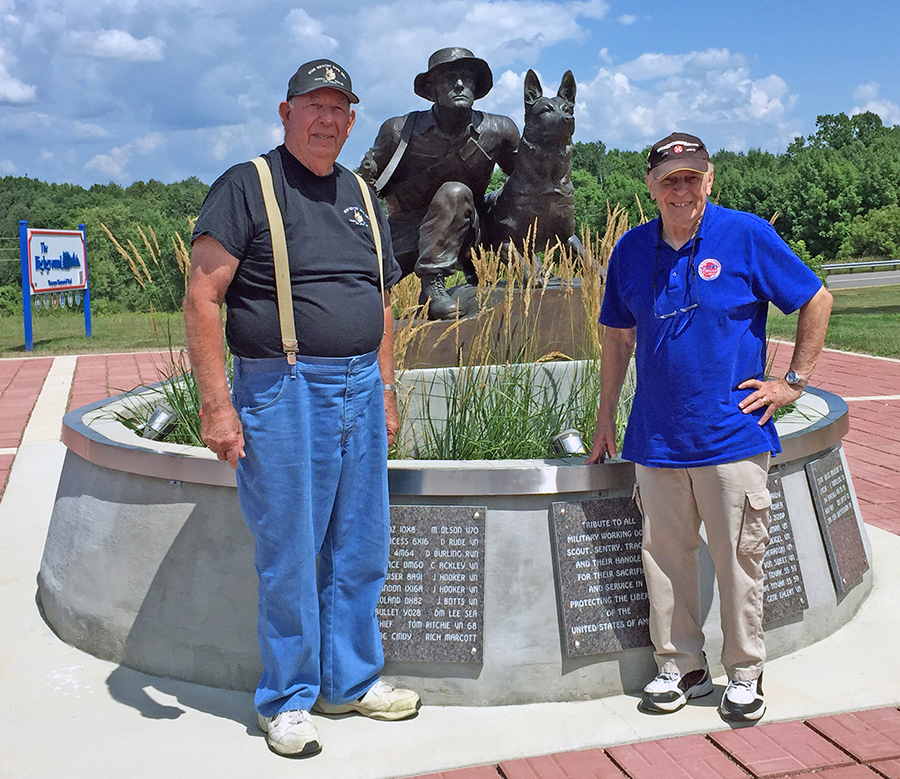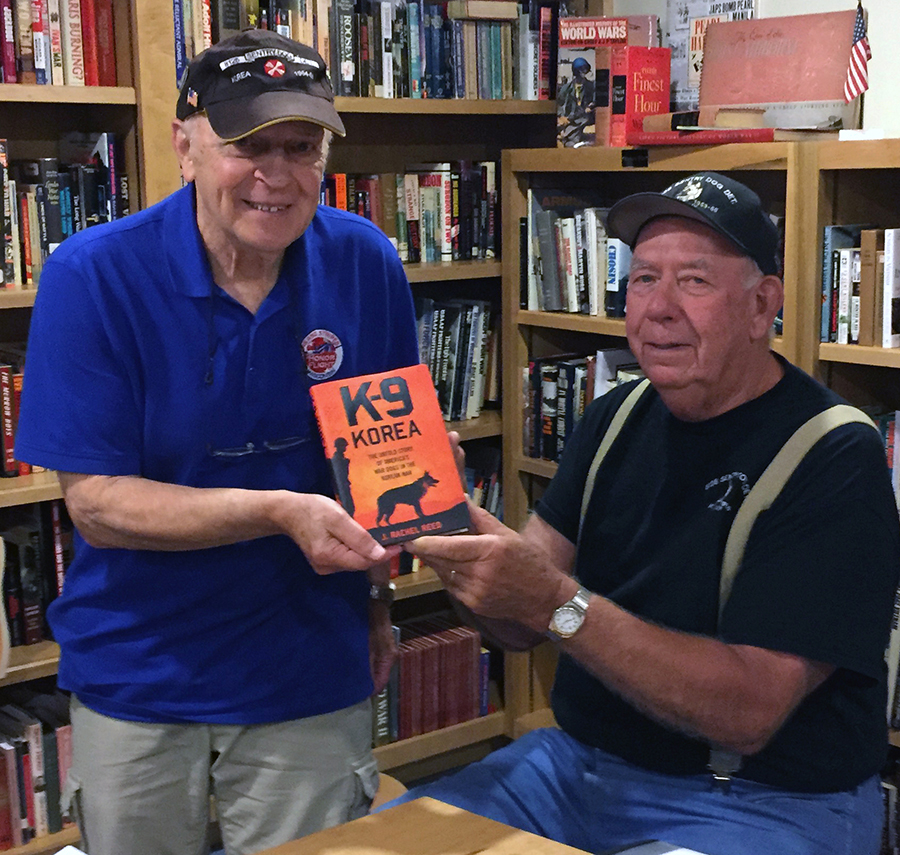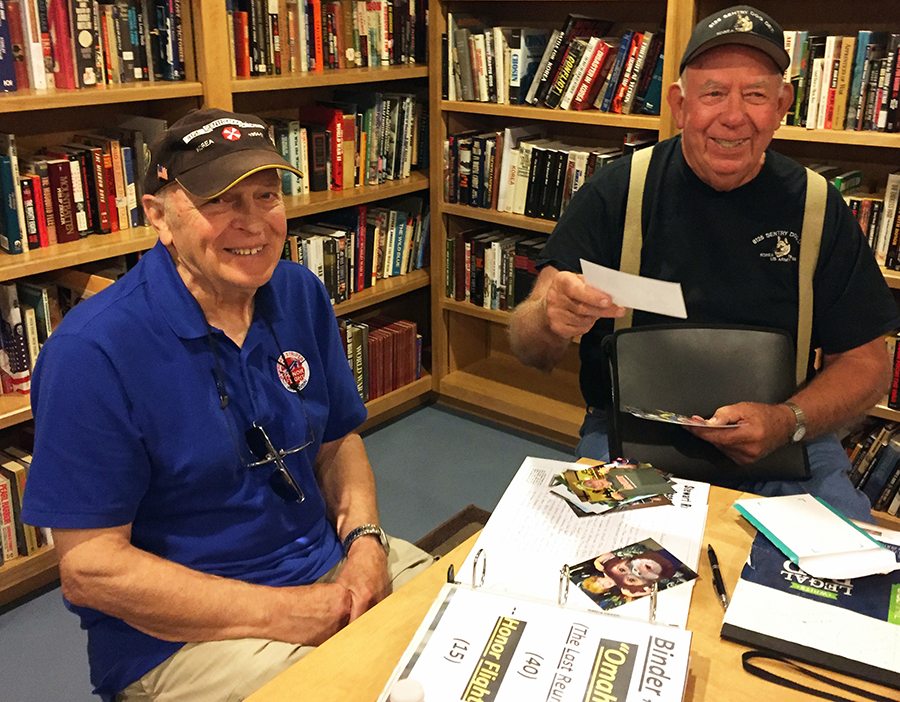Two University of Wisconsin-Stout alumni won’t ever forget the German shepherds who stood sentry duty with them in Korea, protecting supplies and ammunitions.
Harlan Hoffbeck’s and Don Stewart’s stories are part of the book “K-9 Korea: The Untold Story of America’s War Dogs in the Korean War,” written by J. Rachel Reed and published in 2017.
Hoffbeck, a native of Morgan, Minn., joined the U.S. Army in 1953 and Stewart in 1954. “At that period of time in the 1950s there was no work for 18-year-olds just out of high school,” Hoffbeck said.
Seventy years ago, in 1948, the Republic of Korea (South Korea) and then later the Democratic People’s Republic of Korea (North Korea) were established. The Korean War would start in June 1950 and end in July 1953 with an armistice.
After basic training, Hoffbeck realized he was destined for the front lines of the war, until he walked by a bulletin board and saw a sign that said: “Join the doggies. Trainers and handlers needed.” Having no idea what he was signing up for, Hoffbeck added his name to the list.
Soon he was assigned to 8125 Sentry Dog Detachment and eventually met the dog he would work with, Greta. After eight weeks training at Camp Carson in Colorado Springs, Colo., they were shipped to Ascom City, Korea, in October 1953 where their job was to protect a supply building from theft.
“We walked the grounds with our dogs,” Hoffbeck recalled. “The dogs were kept in their kennel otherwise. They were mean except to their handler. That was what they were supposed to do.”

The dogs were fed once a day, a can of horsemeat mixed with a half box of cereal and a pan of water.
Stewart, six months after Hoffbeck, was originally assigned a dog named Duchess, who turned tame and could not stay in training. His next dog was named Spooks. Stewart does not know why he was assigned to the dog detachment but believes it may have been because he grew up on a farm near Osseo and always liked dogs.
Spooks and Stewart protected an ammunitions site in Korea. “We were a couple of miles from the camp area,” Stewart recalled. “We would work the area at night when you couldn’t see three feet ahead of you. The dog could smell a couple of hundred yards and would alert. I would release the chain, and a few seconds later you would hear some screaming.”
Postwar education at UW-Stout
When their enlistment ended, Hoffbeck and Stewart returned to the states. Greta and Spooks stayed in Korea. Neither veteran knows the fate of their canine companion.
Hoffbeck enrolled at UW-Stout, graduating in 1960 with a degree in industrial arts and an emphasis in wood. He returned to the university, gaining a master’s degree in audio visual education in 1968, while working as a teacher at Lane Junior High School in West Allis. In 1967 he started working at UW-Stevens Point teaching audio/visual classes and working up to physical plant director, retiring in 1990.
When he was discharged from the military, Stewart enrolled at UW-La Crosse for a degree in physical education. After injuring his head in a diving accident, he transferred to UW-Stout for technology education with an emphasis in printing, graduating in 1961. While at UW-Stout he played football as a halfback and defensive back. In 1964, he earned a master’s degree in technology education.
“I wouldn’t have been able to afford college at all without the GI Bill,” Stewart said.

One of his favorite memories of UW-Stout is when then-presidential candidate John F. Kennedy visited the campus in February 1960. “I was assigned to take his picture,” Stewart said, noting he was a photographer for the Stoutonia campus newspaper and the Polaris yearbook staff at the time. “That was pretty neat.”
After graduating, Stewart started working at a publishing company but then applied to work at a junior high school in Racine, where he taught for 22 years and then taught and coached at Horlick High School for 12 years before retiring in the mid-1990s.
Even though they were in Korea at the same time, working as dog handlers and attended UW-Stout at the same time, Stewart’s and Hoffbeck’s paths never crossed. “Don followed me into the service, to Korea and to UW-Stout by about six months,” Hoffbeck said.
Stewart, of Racine, and Hoffbeck, of Custer, met for the first time at a September 2013 reunion of the 8125 Sentry Dog Attachment in Nevada and have become friends, sharing their experiences of UW-Stout and serving in the Army.
The 8125 Dog Sentry Dog Attachment had its last reunion in September 2017 in Omaha, Neb. The group decided to end the reunions because of dwindling numbers of participants due to deaths, and as they have aged the surviving members have more difficulty traveling.
Highground K-9 memorial
Recently Stewart and Hoffbeck met at the Highground Veterans Memorial Park in Neillsville. A memorial was dedicated there in June to military dogs and their handlers. Stewart and Hoffbeck attended the dedication.
The memorial features a soldier holding an M-1 rifle and his dog’s harness. The life-size bronze sculpture is of a German shepherd, the most common breed that served in Vietnam, the era featured in the memorial.
The memorial is fitting for the dogs who served their country, Hoffbeck and Stewart agreed. Originally, they had been told by the military that the dogs would return home with them. However, then it was determined the dogs would be too mean to anyone other than their handler and should not return to the U.S.
“It was hard to separate. You developed such a strong bond with your dog,” Hoffbeck said.
When he left Korea, Hoffbeck couldn’t bring himself to say goodbye to Greta, but Greta never left him, he said. He described her as a ghost, forever heeling at his side.
Stewart said the “K-9 Korea” book by Reed recognizes the dogs that served. “The dogs never came back,” said Stewart, who is married to wife Karen; they have one grown child. “They served just like us.”

The book has given Hoffbeck joy in his later years, not only helping him share memories of Greta and speaking about their service but also helping him meet Stewart and others who served in Korea.
“The book remembers the dogs who were left over there,” said Hoffbeck, who is married to wife Cecelia; they have five children, four grandchildren and two great-grandchildren. “They are veterans too. Those dogs served the same way we did.”
UW-Stout is Wisconsin’s Polytechnic University, with a focus on applied learning, collaboration with business and industry, and career outcomes.
###
Photos
UW-Stout alumni Harlan Hoffbeck, at left, and Don Stewart, are pleased a memorial was dedicated in June to military dogs and their handlers at the Highground Veterans Memorial Park. Both attended UW-Stout after the war, although their paths never crossed at the university. / UW-Stout photos by Pam Powers
Stewart, at left, and Hoffbeck are part of the book “K-9 Korea: The Untold Story of America’s War Dogs in the Korean War,” written by J. Rachel Reed and published in 2017.
Stewart, at left, and Hoffbeck reminisce about serving in Korea with their military dogs during a visit to the Highground Veterans Memorial Park in Neillsville.




